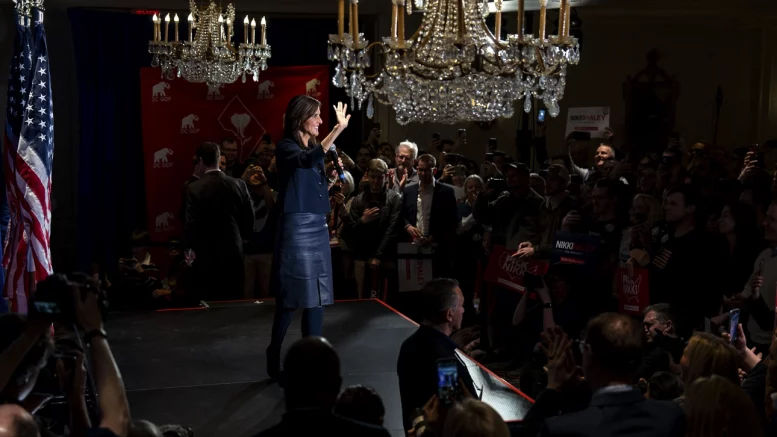Nikki Haley clinched her inaugural presidential primary victory on Sunday, an accomplishment awaiting validation from the D.C. insider electorate.
Haley emerged victorious over Donald Trump in the Republican primary held in Washington, D.C., unfolding over the weekend within close proximity to the bustling center of D.C.’s lobbying arena. According to D.C. party authorities, Haley secured nearly 63 percent of the vote.
However, Haley’s triumph followed a string of defeats by Trump in caucuses across Missouri and Idaho, as well as at a Republican convention in Michigan the previous Saturday. Trump’s trajectory toward the GOP nomination remains unimpeded, with projections favoring his triumph in primaries across 16 Super Tuesday states slated for the upcoming week.
Nonetheless, the composition of the GOP electorate in D.C., where Republicans constitute merely 5 percent of registered voters, starkly differs from the conservative base prevalent in other regions of the country. Patrick Mara, chair of the D.C. Republican Party, characterized this demographic as more politically sophisticated, immersed in political discourse through mediums such as podcasts and newsletters.
Dan Schuberth, a supporter of Haley in the primary, described D.C. Republicans as a distinctive electorate, often personally acquainted with individuals involved in political campaigns. This informed electorate, comprised of individuals who avidly follow publications like POLITICO and The Hill, participated in the primary voting process spanning three days at the Madison Hotel, where Haley also conducted a campaign rally.
While Haley garnered support from various quarters, including Dana Milbank, a Washington Post columnist who recently switched his voter registration to participate in the primary, the typical behavior and ideology of D.C. Republicans diverge from those outside the district. Dennis Paul, a retiree and lifelong D.C. Republican, noted the comparatively moderate leanings of the district’s populace.
Trump’s chances in the D.C. GOP primary were deemed slim, given his previous third-place finish in the 2016 contest. Despite Trump’s efforts to court D.C. Republicans this year, his campaign’s attempt to pressure lobbyists to vote in the primary was met with criticism. Haley condemned such tactics during her campaign in Massachusetts, emphasizing the importance of inclusivity in presidential candidacy.
Although Haley secured her inaugural primary victory, she remained noncommittal about extending her campaign beyond the upcoming Tuesday contests. Haley’s focus remained on Super Tuesday, with no public events scheduled for the election night. At a rally in Portland, Maine, she emphasized the significance of broadening support rather than alienating potential voters.
In the midst of her campaign, Haley received an endorsement from Senator Susan Collins of Maine, lauding her resilience and leadership qualities. Despite the challenges ahead, Haley remained determined to navigate the complex landscape of the presidential race, propelled by her recent victory and a drive for broader support.

